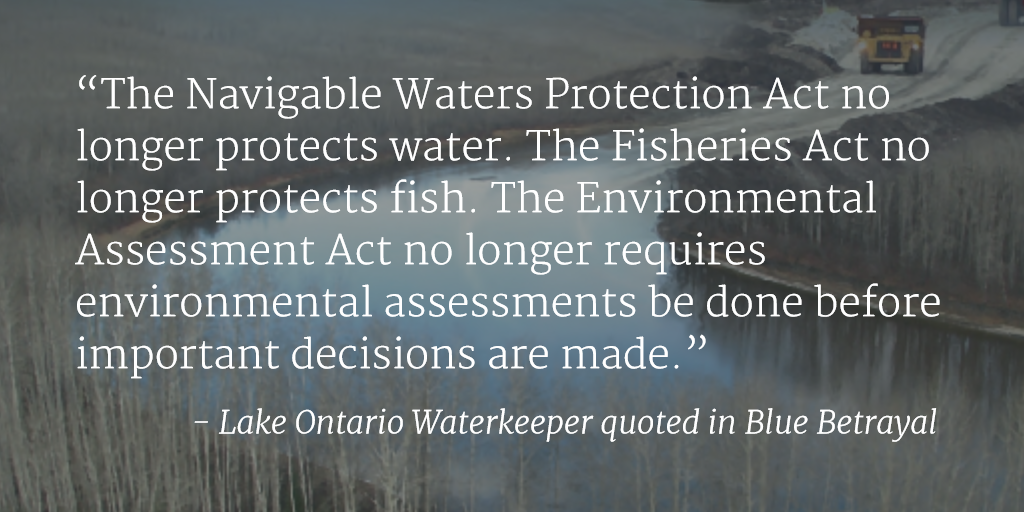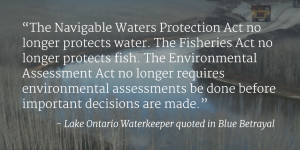Former UN Advisor Maude Barlow issues scathing report on Harper’s legacy on water

from the Council of Canadians
The UN recognized last Sunday, March 22 as World Water Day, but a former UN advisor on water says that Canadians did not have much to celebrate this year.
Maude Barlow, former UN advisor on water and bestselling author, gives Stephen Harper’s government a failing grade in her report Blue Betrayal, launched by the Council of Canadians.
“The Harper government has put Canada’s freshwater heritage at great risk. The values of greed driving the Harper government’s policies are not shared by the majority of Canadians who want our waterways protected by strong laws and who view water as an essential public service,” writes Barlow.
From gutting legislation to slashing funding for water protection and research, from promoting water privatization to tying international aid to water-destroying resource extraction by Canadian corporations, Harper’s agenda against water and the environment is clear, says the report.
As well, actions such as the overhaul of the Fisheries Act, the delisting of 99% of lakes and rivers under the Navigation Waters Protection Act, and the changes to the Canadian Environmental Assessment Act that cancelled 3000 environmental assessments are risks to drinking water. Meanwhile the government promotes tar sands, pipeline, fracking and other projects that threaten drinking water.
This week, a UN report revealed that within 15 years, the world will be in a water crisis.
Barlow says that action is urgent, “The federal government is setting the country up for a freshwater crisis if it doesn’t reinstate funding, freshwater protections and research programs. In a world running out of accessible water, we have no choice but to fight for the laws and policies that will protect our water for people and the planet forever.”
The report can be found here.
Media coverage
Scathing report on health of Canada’s waters accuses Ottawa of wilful negligence
Council of Canadians report describes Great Lakes as “a dumping ground for our toxic waste, and more recently, as a carbon corridor to transport tar sands bitumen, fracked gas and fracking wastewater”
By: Raveena Aulakh Toronto Star Mar 24 2015
Canada is taking its vast freshwater resources for granted, wrecking them in the process, says a scathing new report.
Titled Blue Betrayal, it also warns that climate change; industrial farming; melting glaciers; oil, gas and mineral extraction; and dumping of waste — sometimes toxic waste — into our waterways are all growing threats to our diminishing water supplies.
The report, authored by Maude Barlow of the Council of Canadians, a non-governmental organization, accuses Ottawa of turning its back on water resources to advance the interests of the energy industry.
“On both sides of the border, we continue to see the Great Lakes as a dumping ground for our toxic waste, and more recently, as a carbon corridor to transport tar sands bitumen, fracked gas and fracking wastewater,” Barlow said on Monday, calling those the “most dangerous energy sources on Earth.”
A big chunk of the report talks about the steps Ottawa has taken that have made freshwater resources more vulnerable, such as targeting scientific institutes and projects that did important work. Included in that list is the plan to dismantle the Experimental Lakes Area (ELA), the world’s leading freshwater research institute.
The facility has been saved, at least temporarily, by the Ontario and Manitoba governments.
(The report also accuses past Liberal and Conservative governments of allowing Canada’s lakes, rivers and groundwater to deteriorate.)
Environment Canada did not respond to a request for comment.
The report comes on the heels of World Water Day, marked on Sunday. It doesn’t paint a healthy picture of the Great Lakes, a source of livelihood for more than 40 million people in Canada and U.S.
It says there are at least 204 pollutants in the Great Lakes, including plastic in various forms.
Fish in the Great Lakes are loaded with contaminants such as mercury, dioxins and lead, it adds.
The state of the Great Lakes is particularly worrisome for environmentalists because of blue-green algae, which has made a comeback in recent years.
Mark Mattson of Lake Ontario Waterkeeper says Toledo’s drinking water advisory last summer was a wake-up call that “we can’t take the Great Lakes for granted.”
Toledo’s nearly 500,000 residents were told not to use water for drinking, cooking or bathing in August 2014 after tests at a treatment plant showed dangerous toxin levels due to a toxic algae bloom in Lake Erie, from which the city draws its drinking water.
“You don’t expect communities around the Great Lakes to have any drinking water advisories,” said Mattson. “We mainly see these advisories in small, rural communities … because the Great Lakes can mask these problems for much longer than these small places.”
This report isn’t the only one this week warning of the dire consequences of misusing water resources: a United Nations report, released in New Delhi, warned there could be a 40 per cent shortfall in water globally in 15 years unless countries dramatically change their use of the resource.
The world’s population is expected to grow to 9 billion by 2050 and more groundwater will be needed for farming, industry and personal consumption, said the report.
Demand for water will increase 55 per cent by 2050, it said.
But many underground water reserves are already running low and rainfall patterns are predicted to become more erratic with climate change, the report pointed out.










Leave a Reply